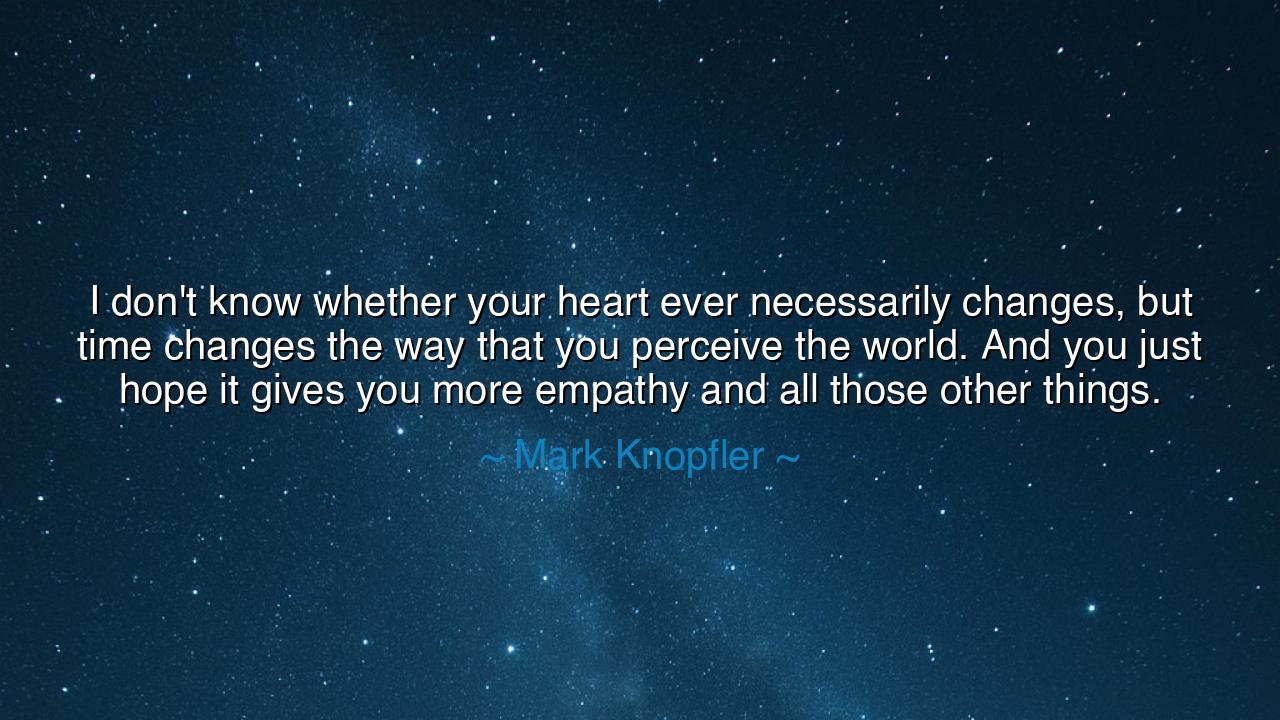
I don't know whether your heart ever necessarily changes, but
I don't know whether your heart ever necessarily changes, but time changes the way that you perceive the world. And you just hope it gives you more empathy and all those other things.






The musician and storyteller Mark Knopfler, whose songs often flow like rivers of quiet reflection, once said: “I don’t know whether your heart ever necessarily changes, but time changes the way that you perceive the world. And you just hope it gives you more empathy and all those other things.” In these gentle and contemplative words lies a truth as old as life itself: that while the essence of who we are may remain constant, time, through its long and patient lessons, reshapes the way we see, feel, and understand. Knopfler speaks as one who has journeyed far—not only across years, but through the shifting landscapes of love, loss, and wisdom. His words are not about transformation through force, but evolution through experience—the slow ripening of the heart that comes only with the passing of seasons.
When he says he does not know whether the heart ever changes, Knopfler touches upon a mystery that philosophers and poets have wrestled with for ages. The heart—the deep self, the seat of emotion and character—may be born with a certain rhythm, a core that remains steady even as the world turns. Yet, though its essence endures, the lens of perception through which we view life is constantly altered by time. Youth sees with fire; age sees with light. The same world that once seemed full of glory and possibility may, in later years, appear softer, more fragile, more interconnected. Time does not necessarily rewrite the heart—but it teaches it to listen differently, to notice what once was ignored, to feel not only one’s own pain, but the pain of others.
The origin of this insight lies in Knopfler’s life as an artist and observer of humanity. As the frontman of Dire Straits, he chronicled the struggles and triumphs of ordinary people with remarkable tenderness. His art was not born from rebellion, but from reflection. Over time, his music became quieter, more introspective—less about ambition, more about understanding. This quote, likely born in the stillness of later years, reflects that transformation. It is the confession of a man who has watched his passions mellow into compassion, whose sharp edges have been worn smooth by time. What he once sought in glory or success, he now finds in empathy. Thus, the quote is not a statement of uncertainty, but of humility—a recognition that time, not will, is the greatest teacher of the human soul.
Consider the story of Nelson Mandela, who entered prison filled with righteous anger and emerged decades later as a man of extraordinary grace. His heart, perhaps, had not changed—he still loved justice, freedom, and his people. But time changed the way he perceived the world. The fire of youth, once consumed by resistance, matured into a light of reconciliation. He saw that the truest strength was not in vengeance, but in forgiveness. From this transformation was born a leader whose empathy healed a nation. Mandela’s life is the living proof of Knopfler’s wisdom: that while the core of the heart endures, its understanding deepens through the passage of time, turning pain into perspective and fury into compassion.
Knopfler’s reflection also speaks to the power of empathy as the crown of human growth. To become empathetic is not to lose oneself, but to expand the boundaries of the self—to see the world not only through one’s own eyes, but through the eyes of others. As time humbles us with loss, disappointment, and aging, it also grants us this sacred gift. The young often see life in terms of conquest, the old in terms of connection. The same heart that once sought victory learns, at last, the value of gentleness. Thus, time refines the heart without changing its essence, just as a sculptor releases beauty from within the stone without replacing its nature.
This wisdom calls us to live with patience and awareness. When we are young, we long for change to come swiftly—for the heart to heal, for the world to understand. But Knopfler reminds us that understanding is not born in haste; it comes only through the slow, merciful work of time. We cannot force empathy—it must unfold as life humbles and enlightens us. To gain this wisdom, one must live fully, listen deeply, and allow both joy and sorrow to do their quiet work upon the soul. For every hardship, every love, every failure, becomes a chisel in the hand of time, shaping us into beings more capable of compassion.
So, my child, take this lesson and carry it like a lantern through your days: the heart may not change, but it can learn to see more clearly. Do not fear the passing of time, for it is not your enemy—it is your greatest teacher. Let it soften your judgments, deepen your gratitude, and expand your empathy. Seek not to escape life’s sorrows, but to understand them, for they are the soil in which kindness grows.
And when you reach the later hours of your life, may you look back as Mark Knopfler does—not with regret, but with quiet wonder. May you see that time has not robbed you, but refined you—that though your heart beats the same, it beats now with greater wisdom, tenderness, and truth. For this is the final gift of time: to turn the pulse of life into the rhythm of compassion, and to make of every soul a vessel of understanding that lights the path for others.






AAdministratorAdministrator
Welcome, honored guests. Please leave a comment, we will respond soon